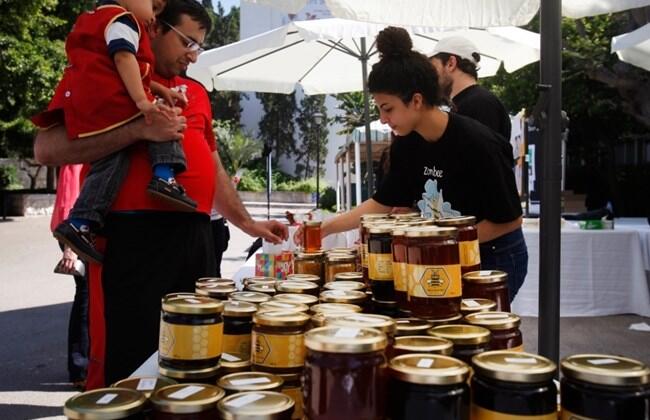Timour Azhari| The Daily Star The American University of Beirut hosted its triennial Honey Day Wednesdy, in an effort to raise awareness about the role of bees in nature and funds for its campus apiary. Rami Ollaik, a professor of beekeeping, and 25 of his apiculture students sold a wide array of honeys, including oak, orange and wild thistle, along with other honey-based goods such as cookies and muffins and humorous T-shirts reading “Hive Five,” “Buzzkill” and “ZomBee.” The honey was produced entirely on AUB’s campus, in a sunny courtyard between the International College and the American Community School. “These hives date back 12 years, that makes us pioneers in urban beekeeping in the region,” the professor said. “We’ve also never had a major incident.” The hives are located next to a purpose built lab with artificial insemination capabilities and honey extraction equipment. Students of apiculture regularly come to check on the bees, process the honey and evaluate the quality of the product. While the atmosphere was light, the issues raised by the students and faculty were of a more serious nature. Ollaik voiced grave concern about Colony Collapse Disorder, a term used to describe the mass disappearance of worker bees from hives, which eventually leads to a breakdown of the colony. “Bees have been vanishing all over the world since around 2006; it is a global phenomena for which we don’t have all the answers,” Ollaik said. Asked about the importance of bees, he said that they perform a crucial task as the main pollinators in nature. He cited a quote by renowned physicist Albert Einstein, who once said that if bees disappear from the surface of the earth, man will have no more than four years left to live. “Ninety percent of almonds are fertilized by bees, as well as 100 percent of oranges,” explained Nuha, one of the students taking part in the event. Bees pollinate a vast number of fruits and vegetables that are staples of human consumption, including eggplants, nectarines, onions and various types of nuts. While scientists have not found a single cause for CCD, they point to the effects that man-made changes to the environment have had, a sentiment echoed by Ollaik, who said climate change, misuse of pesticides, deforestation and pollution are prime causes of the disorder. Unfortunately, the factors that are purported to cause Colony Collapse Disorder are widespread in Lebanon. The Daily Star has previously reported on the presence of banned toxic pesticides in Lebanon, which have been found at levels up to 25 times the international standard on local agricultural produce. These levels are toxic to humans, and based on a study published by Harvard last year, can also affect the memory and coordination of bees, which could explain why they leave their hives and do not return. While this could point to a bleak future for honey bees, the organizers of the event were positive, and said they hoped that by raising awareness about CCD and maintaining the campus beehives, they are doing something which, in the future, could help save humanity from its own misguided actions. “I’ve become more aware of my irrational fear of bees through this course, and I’ve realized how they are a completely vital part of the ecosystem with which we cannot live without,” said Talia, a student who helped promote the event. Watching a group of kids laugh and shriek in awe of a large live honeycomb on display, it is possible to imagine that instilling these children with a better understanding of nature could be a force for change. However, it remains to be seen whether the fast-disappearing bees have time to allow this learning process to take its course.
















